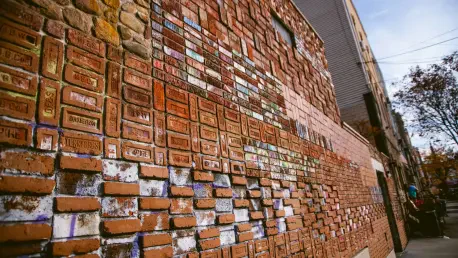In the fast-evolving realm of sustainable construction, a Scottish cleantech company named Kenoteq has made a significant impact with its groundbreaking product, the K-BRIQ. Spun out from Heriot-Watt University, Kenoteq is revolutionizing the industry by tackling the persistent issues of construction waste and environmental degradation. This mission is embodied in the K-BRIQ, a brick manufactured from almost entirely recycled construction waste. Recently, this innovative product earned certification from the British Board of Agrément (BBA), marking a pivotal moment for eco-friendly construction materials. The K-BRIQ symbolizes years of dedicated research aimed at slashing carbon emissions and efficiently managing waste, ultimately setting a new standard in the construction sector.
Transformative Environmental Impact
What sets the K-BRIQ apart is its ability to significantly curb environmental damage associated with traditional construction materials. Unlike conventional clay bricks, the K-BRIQ is unfired, which leads to a remarkable 95% reduction in carbon emissions. To put this into perspective, constructing a standard two-bedroom house in the UK typically necessitates 12,000 bricks. Opting for K-BRIQs over traditional bricks cuts carbon emissions from an estimated 5.46 tonnes to a mere 0.2 tonnes of CO2e. This reduction is akin to taking a gasoline-powered vehicle off the road for an entire year. This substantial cutback on energy and emissions highlights the K-BRIQ’s potential as a sustainable alternative for builders and developers who are increasingly seeking environmentally responsible materials.
The push for certification in the construction industry plays a crucial role in accelerating the use and acceptance of innovative materials. The recent BBA certification of the K-BRIQ stands as a major milestone, mitigating former hurdles concerning insurance, warranty, and regulatory compliance. Certification assures stakeholders about the product’s safety, efficacy, and trustworthiness, paving the way for its adoption in various construction projects throughout the UK. With BBA endorsement, the K-BRIQ meets the stringent standards to rival traditional building materials while maintaining its eco-friendly edge. Beyond the UK, the K-BRIQ has also achieved certification in the United States and is on track for approval in European markets, showcasing its readiness for global influence.
Addressing Broader Industry Challenges
The innovation behind the K-BRIQ emerges at a critical juncture when the construction sector grapples with substantial environmental concerns. As one of the largest contributors to landfill waste, this sector has historically relied on finite resources for construction materials. In the UK alone, over 60% of the waste generated comes from construction, demolition, and excavation activities. Additionally, the nation’s dependence on imported bricks—amounting to over 500 million annually—exacerbates the environmental impact. The K-BRIQ presents a promising solution by utilizing construction waste and reducing reliance on imports, effectively diminishing the construction industry’s environmental footprint.
To align with these environmental goals, Kenoteq has initiated an expansion of its production capacity to meet growing demand. Its facility in East Lothian has an annual output capacity of two million bricks, with plans to double this to accommodate the increasing need for sustainable building materials. This production capability is critical at a time when the construction industry is under mounting pressure to not only reduce emissions but also adhere to rigorous safety and quality standards. By enhancing its manufacturing capacity, Kenoteq is positioning itself to supply eco-conscious consumers without compromising on performance or reliability.
Market Acceptance and Future Outlook
The K-BRIQ has garnered strong interest, particularly from public sector organizations and developers focused on climate goals. In urban areas like the City of London, the brick is seen as vital to achieving environmental benchmarks. Its positive environmental attributes make it an attractive option for educational estates, expansive office complexes, and large urban redevelopment projects seeking to minimize their carbon footprints. As sustainability becomes a critical factor for modern construction projects, solutions like the K-BRIQ are increasingly central to meeting these objectives.
Besides its environmental credentials, the K-BRIQ offers practical design benefits, with availability in 12 colors using recycled pigments. This flexibility allows architects and developers to utilize the brick in diverse aesthetic contexts without sacrificing sustainability. BBA certification further amplifies its appeal by ensuring high standards of durability, safety, and fire resistance, with some variants receiving A-class fire ratings. By offering a blend of aesthetic versatility and stringent certification, the K-BRIQ enhances its desirability within the construction materials market.
Kenoteq’s strategic approach in developing the K-BRIQ is not only transforming construction norms but also setting an example for embracing sustainable practices. By demonstrating that eco-friendly materials can meet high safety and performance standards, it removes barriers that often hinder the widespread adoption of green innovations. As Kenoteq’s work receives recognition from prestigious bodies both domestically and internationally, the company continues to position itself as a frontrunner in the sustainable building materials domain.
A Pivotal Advancement in Construction
In the swiftly changing field of sustainable construction, a Scottish cleantech company called Kenoteq is gaining attention with its innovative product, the K-BRIQ. Emerging from Heriot-Watt University, Kenoteq aims to transform the industry by addressing the ongoing problems of construction waste and environmental harm. Their solution, the K-BRIQ, is an eco-friendly brick crafted almost entirely from recycled construction waste. This innovation recently received certification from the British Board of Agrément (BBA), signifying a major advancement for environmentally conscious construction materials. The K-BRIQ represents years of intense research directed at reducing carbon emissions and managing waste efficiently, thereby establishing a new benchmark within the construction sector. As the demand for greener solutions grows, Kenoteq’s K-BRIQ stands out as a symbol of progress, potentially reshaping the future of building practices and inspiring further advances toward sustainability in construction worldwide.









